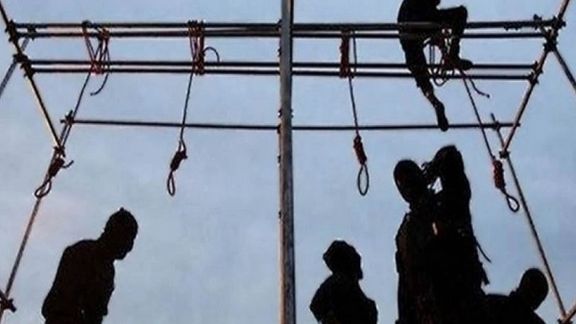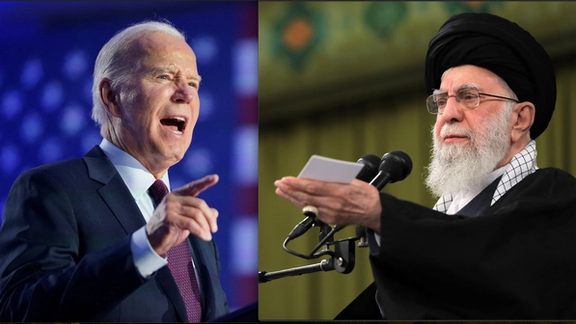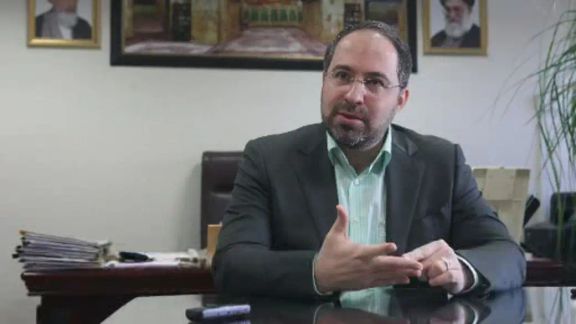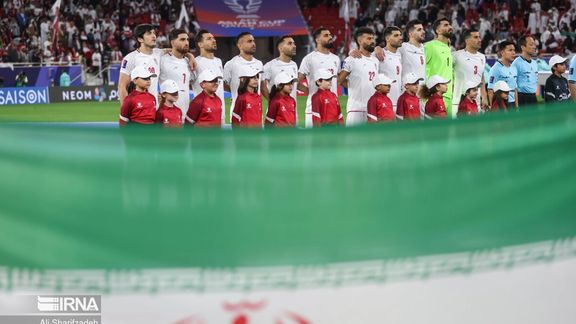Executions Surge In Iran Despite International Appeals

A human rights group has warned about a disturbing trend in Iran's judiciary system, reporting a significant surge in issuing death penalties during January.

A human rights group has warned about a disturbing trend in Iran's judiciary system, reporting a significant surge in issuing death penalties during January.
According to the US-based Human Rights Activists News Agency (HRANA), Iranian courts issued 35 death sentences, marking the highest number of death penalties issued within a single month in over a year. Meanwhile, a total of 86 people were executed across the country during January alone.
The surge comes on the heels of a similarly grim situation in January 2023, during which at least 63 people were executed in Iran, with 23 death sentences issued.
Despite mounting international calls for the abolition of the death penalty, particularly for non-serious crimes, Iran persists in carrying out executions. HRANA contends that the Iranian government utilizes the issuance and implementation of death sentences as a means to quell dissent. Notably, Mohammad Ghobadloo, a protester detained during the 2022 uprising, was among those executed in January 2024.
The concluding section of the report emphasizes the Islamic Republic's response to global demands for upholding human rights standards. It calls for judges, interrogators, and members of security forces involved in violating the standards to face recognition of their responsibility through international sanctions.
A recent Amnesty International report further underscored the severity of the situation, revealing that from January 1, 2012, to July 31, 2023, over five thousand individuals, including at least 57 children, were executed in Iran.

Since assuming the position of Supreme Leader of Iran in 1989, Ali Khamenei has steadfastly adhered to his ‘no-talks, no-détente’ policy towards the US, a pivotal element of his strategic approach.
This does not mean that the Iranian government refrained from clandestine and overt sporadic negotiations with the United States, undertaken with specific objectives to safeguard its interests. However, none of these negotiations were directed at alleviating tensions.
An illustrative instance and what ensued is evident in Khamenei's remarks during the 2015 nuclear talks: “The ongoing discussions, including those with Americans, solely revolve around the nuclear issue. Now, should the opposing side rectify its misconduct, that could serve as a precedent for broader discussions on other matters as well.”
However, subsequent developments revealed that this statement was not entirely candid. Consider the following timeline:

In essence, Khamenei expressed this view before even the ink on the signatures had dried, let alone allowing time to observe whether the US would rectify what he labeled as its ‘misconduct.’ When Donald Trump withdrew from the nuclear deal in 2018, it provided Khamenei with a golden opportunity to assert, “I told you so.” He said, “The nuclear talks were a mistake. I made a mistake. As a result of the insistence of the gentlemen (referring to the then moderate administration of Hassan Rouhani), I allowed an experiment.”
He has consistently asserted that the conflict between the Iranian government and the US is a “certain and inevitable” situation. The central doctrine of the Iranian Revolutionary Guards (IRGC), which is Iran’s other locus of power besides Khamenei, also maintains that the hostility between the Islamic Republic and America is “fundamental and existential that cannot be resolved through negotiation and compromise.”
But why is the Iranian radical camp led by Khamenei so resolute and persistent in maintaining its “no talks, no détente” stance towards the United States?
While a prevailing explanation attributes this unwavering position to ideological differences, and there is no denying of the role of ideology, over the course of Khamenei’s 35-year rule, three presidents—Akbar Hashemi Rafsanjani, Mohammad Khatami, and Hassan Rouhani—attempted to mend US-Iran relations, all in vain.
Rafsanjani, who was the key to Khamenei becoming Supreme Leader, died in suspicious circumstances in 2017, while having been ostracized from politics. The other two presidents considered old guards, have not only been marginalized but also silenced. In a notable example, in 2003, under Khatami’s presidency, his administration unofficially proposed a “grand bargain deal” to the US government aimed at resolving all the disputed issues. The offer was rejected by the George W. Bush administration, which deemed it insincere without Khamenei's endorsement.
In contrast, the Soviet Union, despite deep ideological differences and strategic rivalry with the US during the peak of the Cold War, maintained diplomatic relations at the highest level and signed détente agreements with America. Similarly, communist-ruled China and Vietnam not only have full diplomatic relations with the US but also boast extensive economic ties.
A deeper comprehension of this conflict can be grasped through the lens of realpolitik. Khamenei censures individuals who advocate for negotiations with the US, remarking, "Some people are negligent and naive regarding talks [with the US] and fail to grasp the complexity of the issues." So, what exactly is the complexity of these issues?
Infiltration
Observing Khamenei's representatives across various institutions—ranging from the judiciary to the Guardian Council, the IRGC, the army, universities, and government agencies—it becomes apparent that Iran’s ruler staunchly supports individuals who harbor a shared sentiment of anti-Americanism and fears regarding the “infiltration” of America in Iran. In essence, by adhering to this stance, they are safeguarding their very existence.
The conservatives and Khamenei express deep concerns about the prospect of engaging in negotiations with the US and the potential relaxation of tensions, fearing the threat of "infiltration" that could jeopardize the existing traditionalist system. Within this apprehension, Khamenei underscores the significance of cultural influence as the most alarming form of infiltration. He asserts, “The enemy seeks to alter the societal beliefs in the cultural context, manipulating the very beliefs that have upheld this society (read the Islamic government) to inflict damage, create disruptions, and introduce breaches. They allocate billions of dollars for this purpose—this is cultural infiltration.”
Opening doors to America, given the significant allure of American pop culture, acknowledged as a key element of America’s soft power by the renowned political scientist Joseph Nye, could undermine the ideological foundation and authoritarian control of the system. While some argue that a considerable portion of society is already an admirer of Western culture, Khamenei’s concern pertains to the other segment—the traditionalists and devout religious individuals who, despite being a minority in Iran, currently support him, constituting the political base of the existing system.
Rise of technocrats
The rise of technocrats, a trend disliked by Khamenei and reminiscent of his predecessor, Ayatollah Ruhollah Khomeini, who also distrusted them for their association with modernity and Western culture, could emerge as another consequence of nurturing economic ties with the US.
Reestablishing relations with the US could lead to an expansion of trade and commerce, consequently resulting in a surge in the number of Iranians visiting the US and vice versa. The consequence of such exchanges might manifest in the emergence of what conservatives call as “Westoxificated” technocrats as a significant force in Iranian society.
Reconciliation with the US - end of the revolution
Reconciliation with the United States would symbolize the demise of the revolution. Its conclusion would render the supreme leader, Revolutionary Guards, and the hard-line camp obsolete. This is why the IRGC emphasizes that the conflict between the US and Iran is existential and cannot be resolved through negotiations. Enmity towards the US serves as a rallying point for radicals and conservatives led by Khamenei to mobilize their supporters. Reconciliation with the US would undercut the narrative of the deep state, diminishing its capacity to rally its political and religious base, and repression of dissidents.
Where does this conundrum lead?
Khamenei and his cadre of hardliners blame Donald Trump for withdrawing from the nuclear deal. However, the reality is that Khamenei has undermined US-Iran relations for the last 35 years by obstructing sustained talks aimed at détente between the two states. In the absence of diplomacy and bilateral talks to alleviate and contain tensions both in rhetoric and actions—it was inevitable that, regardless of who occupied the White House in the years following the 2015 deal, the nuclear agreement would become unstable and collapse.
However, this is not the sole outcome of the current status quo crafted by Khamenei. When two governments are entrenched in such an antagonistic relationship, ceaselessly plotting and executing actions to harm each other's interests, and fail to mitigate tensions through talks, the question arises: what eventual solution remains other than war to resolve this conflict? Even if neither side expresses a desire for war, as both sides often assert, a spark or a miscalculation can ignite the flames of war. It is a matter of time.

The sister of Johan Floderus, the Swedish EU diplomat detained in Iran, has condemned his captivity as a manipulative act within a larger “political game.”
Floderus, 33, was detained by Iranian authorities in April 2022 at Tehran airport following a visit to a friend working at the Swedish embassy. Since then, he has been subjected to distressing conditions in Evin prison.
At the time of his arrest, Floderus was employed on the Afghanistan desk of the European External Action Service (EEAS), the diplomatic arm of the European Union.
Reports emerged last Sunday indicating that the Iranian prosecutor is seeking the death penalty for Floderus on charges of espionage for Israel and "corruption on earth," a capital offense under Tehran's Islamic laws.
Floderus becomes the latest victim of what many term “hostage diplomacy”, where Western citizens are arbitrarily detained by the Iranian regime on unfounded espionage charges. While previous detainees have been released following concessions by Western governments, the prosecutor's push for the death penalty has stunned Floderus' family.
Speaking to Euronews at a #FreeJohanFloderus campaign event in Brussels, his sister Ingrid Floderus emphasized his innocence, stating, "He is an innocent man. I don't think that anyone really feels like my brother has done those crimes that he has been accused of."
She added, "This is about some big political game where my brother is being used as a pawn, and that is really, for me, something I cannot accept."
Floderus, an alumnus of Oxford University, is believed to be caught in a web of political pressure aimed at the Swedish government. Observers suggest his detention could be linked to Tehran's efforts to coerce the release of Hamid Nouri, a former judicial official of the Islamic Republic, sentenced to life imprisonment for his role in the 1980s political prisoner massacre, which saw the execution of up to 5,000 individuals.

The second court session was held in Canada Thursday to decide if Salman Samani, a former senior official of Iran's Interior Ministry, should be expelled from the country.
Lasting for six hours, the session saw notable revelations, including Samani asserting his role as a “servant of the people rather than the government of the Islamic Republic.”
Samani, intruding himself as a dentist in Canada earning a modest income, appealed to the Canadian government, which is trying to deport Canada-based Iranians with links to the Islamic Republic.
The legal saga began when Samani's name appeared on a list of individuals announced by the Canadian Border Security Agency on December 7, mandating their deportation from Canada. The action triggered a legal battle, with Samani filing a request with the Federal Court of Canada.
The deportation is in line with sanctions implemented in November 2022, preventing senior members of the Iranian regime from entering Canada.
The measures were imposed after Iran's morality police killed Mahsa Amini for defying hijab laws. Amini's death garnered international condemnation and became a symbol of resistance against the repression of women under Iran's clerical regime.
Last week, Majid Iranmanesh, the former director general of Iran’s Vice-Presidency for Science and Technology,was given a final expulsion order from the Canadian Immigration and Refugee Board about. Iranmanesh is the first among nine former officials whose expulsion cases have been reviewed.
Canada severed diplomatic ties with Iran in 2012 due to concerns related to its pursuit of nuclear weapons and support for terrorist organizations including Hamas, whose invasion of Israel on October 7 ignited the current conflict in the Middle East.

Iran’s defeat to Qatar in Asian Cup 2024 soccer tournament has once again underscored the profound rift among Iranians, some of whom rejoiced over the national team’s loss.
Qatar, the host of the games, beat Iran 3-2 in semi-finals in Doha on Wednesday. In the aftermath of the match, some Iranians took to the streets in cities like Sanandaj, Javanroud, Ahwaz, and Qazvin, celebrating with singing and dancing. Meanwhile, on social media platforms, others exchanged congratulations over the team's loss, expressing a disassociation from a squad they no longer perceive as their own, branding it as the "Mullahs' team."
Cars honking in Sanandaj after the national team’s loss against Qatar
“The team of the mullahs lost and now its supporters are saying those who are happy about the loss of their country's team are not [patriotic] Iranians. The answer to them is that this team is not the ‘national’ team and will never be,” an X post said. “There is a sea of blood between you and us that will never dry up before you are gone.”
Some other Iranians accused the opponents of the national team of not being patriotic.
“Although we lost, the Iranian flag still flies high, carried by the resounding chants of the Islamic Iran's glorious national anthem on the lips of our Iranian cheetahs [= squad]... Let's not forget that just last [Iranian] year, following Iran's defeat, the unpatriotic slaves [of the enemies] were cheering loudly,” one of them wrote on X, referring to protesters celebrating the team's exit from the FIFA 2024 World Cup in Doha amidst the Woman, Life, Freedom movement.
people rejoicing the national soccer team’s loss in Javanroud
The unsympathetic attitude of those who celebrated the once popular squad was a reaction to what they believe is the team members’ lack of solidarity with protesters.
Other athletes in 2022-2023 had reacted to the regime’s suppression of protesters by refusing to sing along with the national anthem or cheer at international competitions as did the volleyball, beach football, water polo, and basketball teams despite authorities’ threats. Most of the soccer squad did the same before one match, but were apparently intimidated into silence and submission after that.
People dancing in Qazvin and honking cars
“We are completely different from the rest of the world in two ways: Firstly, we are the only people who wish to return to their past. Secondly, we are the only people who rejoice the loss of their country's sports teams. There is only one reason for this: Hatred of the regime,” one of the many comments on X said.
Another post responded to those who say people of other countries would never rejoice over their national teams’ loss by arguing that other countries would not shoot down civilian airliners, as did the Revolutionary Guards (IRGC) on January 8, 2020, or kill teen protesters such as Nika Shakarami and Sarina Esmaeilzadeh, and claim they had committed suicide, as the regime did during the 2022 protests.
People honking cars and chanting in Shelangabad neighborhood of Ahwaz
However, this was not always the case. Since the FIFA World Cup matches of 1998, it had been a tradition to take to the streets to celebrate the national soccer team's victories, but fans and others had never "celebrated" the team's losses before.
At the height of the Woman, Life, Freedom protests of 2022, however, thousands took to the streets in various Iran cities on November 29 to celebrate the national soccer team’s elimination from the World Cup in a match against the United States.
The squad of the DR of Congo protesting to armed violence in their country
Security forces responded harshly to this unprecedented reaction from the populace and a young man, Mehran Sammak, was shot in the head in the northern city of Anzali while honking his car like many other protesters.
"This is how a national team should act," another post remarked, citing the protest action of the Democratic Republic of Congo's national team members. They covered their mouths and formed their fingers into a gun, placing it against their temples during the national anthem to raise awareness of the armed violence in their country.

Swiss police killed a 32-year-old Iranian asylum seeker who held 15 hostages for several hours on a train using an axe and a knife on Thursday.
The incident occurred between Baulmes and Yverdon-les-Bains in western Switzerland, with the man holding the passengers captive for almost four hours until police stormed the train late on Thursday evening.
According to reports from Vaud police, the hostage-taking began around 6:35 pm local time, when the assailant, speaking Farsi and English, forced the train engineer to abandon his post and join the 14 passengers onboard. The train was immobilized with its doors closed at the Essert-sous-Champvent station, between Baulmes and Yverdon-les-Bains.
Authorities were alerted by passengers directly, leading to the sealing off of the area to facilitate negotiations with the hostage-taker.
The intervention occurred when the perpetrator was separated from the hostages, as stated by Jean-Christophe Sauterel, spokesperson for the Vaud cantonal police. “As the hostage-taker rushed with his axe in the direction of the intervention group, a police officer used his weapon to protect the hostages, fatally hitting the perpetrator,” explained Sauterel. Despite the presence of a doctor among the police team, the man died at the scene, with police asserting that they acted in self-defense.
The Vaud Public Prosecutor's Office has started a criminal investigation into the incident. Attorney General Eric Kaltenrieder stated, “The man's motivations have not been established, nor his psychological state.”
Switzerland is relatively safer among European countries, and hostage-taking incidents of this scale are very rare in the country.
In December, Arman(d) Rajabpour Miyandoab, an Iranian-French national, was arrested in Paris during a deadly knife attack on people.
Rajabpour's social media account, which was opened in the same month on the X platform, contained "many posts about Hamas, Gaza, or generally Palestine."